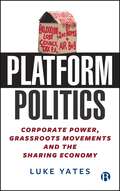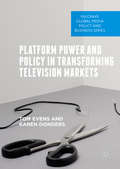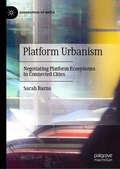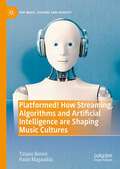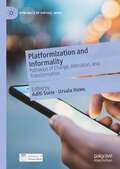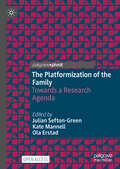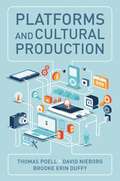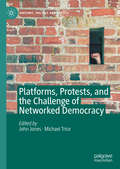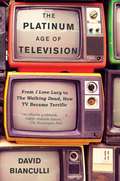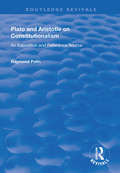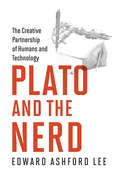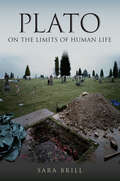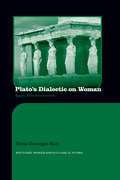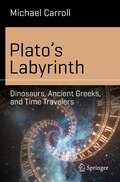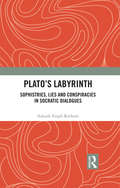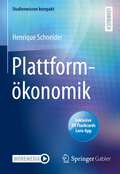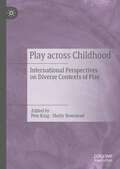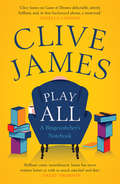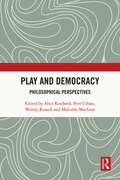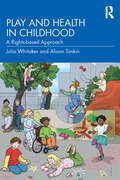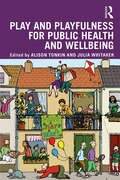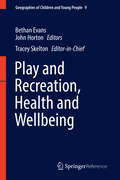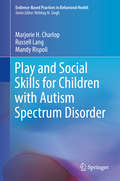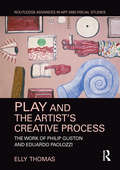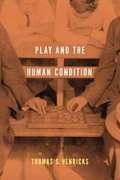- Table View
- List View
Platform Politics: Corporate Power, Grassroots Movements and the Sharing Economy
by Luke YatesThe ‘sharing economy’, powered by companies like Airbnb, Uber and Deliveroo, promised to revolutionize the way we work and live. But what changes have come about, and why? This book shows how platform capitalism is not only shaped by business decisions, but is a result of struggles involving social movements, consumer politics and state interventions. It focuses in particular on the controversial tactics used by platform giants to avoid regulation. Drawing on cutting-edge research and analysis, the book provides a critical overview of the struggles around platforms, examines platform power, and reflects on the different possible futures of the platform economy.
Platform Power and Policy in Transforming Television Markets (Palgrave Global Media Policy and Business)
by Tom Evens Karen DondersThis book seeks to investigate ‘platform power’ in the multi-platform era and unravels the evolution of power structures in the TV industry as a result of platformisation. Multiple TV platforms and modes of distribution are competing–not necessarily in a zero-sum game–to control the market. In the volume, the contributors work to extend established ‘platform theory’ to the TV industry, which has become increasingly organised as a platform economy. The book helps to understand how platform power arises in the industry, how it destabilises international relations, and how it is used in the global media value chain. Platform Power and Policy in Transforming Television Markets contributes to the growing field of media industry studies, and draws on scholarly work in communication, political economy and public policy whilst providing a deeper insight into the transformation of the TV industry from an economic, political and consumer level. Avoiding a merely legal analysis from a technology-driven perspective, the book provides a critical analysis of the dominant modes of power within the evolving structures of the global TV value chain.
Platform Urbanism: Negotiating Platform Ecosystems in Connected Cities (Geographies of Media)
by Sarah BarnsThis book reflects on what it means to live as urban citizens in a world increasingly shaped by the business and organisational logics of digital platforms. Where smart city strategies promote the roll-out of internet of things (IoT) technologies and big data analytics by city governments worldwide, platform urbanism responds to the deep and pervasive entanglements that exist between urban citizens, city services and platform ecosystems today. Recent years have witnessed a backlash against major global platforms, evidenced by burgeoning literatures on platform capitalism, the platform society, platform surveillance and platform governance, as well as regulatory attention towards the market power of platforms in their dominance of global data infrastructure. This book responds to these developments and asks: How do platform ecosystems reshape connected cities? How do urban researchers and policy makers respond to the logics of platform ecosystems and platform intermediation? What sorts of multisensory urban engagements are rendered through platform interfaces and modalities? And what sorts of governance challenges and responses are needed to cultivate and champion the digital public spaces of our connected lives.
Platformed! How Streaming, Algorithms and Artificial Intelligence are Shaping Music Cultures (Pop Music, Culture and Identity)
by Tiziano Bonini Paolo MagauddaGrounded in more than a decade of field research, this book uses empirical examples, quantitative data, and qualitative interviews with young music consumers as well as music industry professionals to understand how the platforms behind music production, distribution and listening work in our digital society. Bringing together the perspectives from science and technology studies, media studies, and the political economy of digital platforms, the book outlines the process of mutual construction between music digital platforms and the cultural value of music in today’s society, and also reflects on the complicated relationship between the power of platforms and the agency of listeners.
Platformization and Informality: Pathways of Change, Alteration, and Transformation (Dynamics of Virtual Work)
by Ursula Huws Aditi SurieIn this edited volume, scholars from Mumbai, Bengaluru, Jakarta, Cape Town, Sao Paulo and other cities of the global South explore the complex relationship between platformization and informality through a different lens. Drawing on extensive theoretical, quantitative and qualitative scholarship, they provide both a useful overview and insights into the lived realities of gig work for platforms covering a range of skills, working conditions, and forms of algorithmic management. Platform work has attracted considerable attention from scholars in the global North, who have tended to view it as a form of casualisation of work that was previously regulated. But what about the global South, where most employment, especially that of women and migrant workers was historically already informal?Beyond a focus on livelihoods, employment, and work, the authors show how labour platforms take on powers that bring about broader impacts, including those affecting identity and personal wellbeing. They also illustrate the impact of platformization on the governance of affected sectors by public agencies, thus affecting political power, and how public data infrastructures contribute to further platformization. The purpose of this pioneering work is to lay bare these interactions to then rebuild our understanding of platformization and its social, political, cultural and economic impacts. Its insights are attentive to gender and ethnic differences, as well as geographical ones.
The Platformization of the Family: Towards a Research Agenda
by Julian Sefton-Green Kate Mannell Ola ErstadThis open access book outlines how the digital platforms that mediate so many aspects of commercial and personal life have begun to transform everyday family existence. It presents theory and research methods to enable students and scholars to investigate the changes that platformization has brought to the routines and interactions of family life including intergenerational communication, interpersonal relationships, forms of care and togetherness. The book emerged from a seminar jointly funded by the Collaboration of Humanities and Social Sciences in Europe project, the Norwegian Research Council and The Australian Centre of Excellence for the Study of the Digital Child.
Platforms and Cultural Production
by Thomas Poell David B. Nieborg Brooke Erin DuffyThe widespread uptake of digital platforms – from YouTube and Instagram to Twitch and TikTok – is reconfiguring cultural production in profound, complex, and highly uneven ways. Longstanding media industries are experiencing tremendous upheaval, while new industrial formations – live-streaming, social media influencing, and podcasting, among others – are evolving at breakneck speed. Poell, Nieborg, and Duffy explore both the processes and the implications of platformization across the cultural industries, identifying key changes in markets, infrastructures, and governance at play in this ongoing transformation, as well as pivotal shifts in the practices of labor, creativity, and democracy. The authors foreground three particular industries – news, gaming, and social media creation – and also draw upon examples from music, advertising, and more. Diverse in its geographic scope, Platforms and Cultural Production builds on the latest research and accounts from across North America, Western Europe, Southeast Asia, and China to reveal crucial differences and surprising parallels in the trajectories of platformization across the globe. Offering a novel conceptual framework grounded in illuminating case studies, this book is essential for students, scholars, policymakers, and practitioners seeking to understand how the institutions and practices of cultural production are transforming – and what the stakes are for understanding platform power.
Platforms, Protests, and the Challenge of Networked Democracy (Rhetoric, Politics and Society)
by John Jones Michael TriceThis book examines the recent evolution of online spaces and their impact on networked democracy. Through an illuminating mix of theoretical and methodological analysis, contributors provide an understanding of how a range of individuals and groups, including activists and NGOs, governments and griefers, are using digital technologies to influence public debates. Contributions consider these phenomena in a global contemporary context, providing within the same volume rigorous examinations of the design of digital platforms for deliberation, users’ attempts to manipulate those platforms, and the ways activists and governments are responding to emerging threats to democratic discourse. Providing diverse, global case studies, this collection is a valuable tool for academics within and beyond the fields of new media, communication, and information policy and governance.
The Platinum Age of Television: From I Love Lucy to The Walking Dead, How TV Became Terrific
by David BianculliTelevision shows have now eclipsed films as the premier form of visual narrative art of our time. This new book by one of our finest critics explains--historically, in depth, and with interviews with the celebrated creators themselves--how the art of must-see/binge-watch television evolved. Darwin had his theory of evolution, and David Bianculli has his. Bianculli's theory has to do with the concept of quality television: what it is and, crucially, how it got that way. In tracing the evolutionary history of our progress toward a Platinum Age of Television--our age, the era of The Sopranos and Breaking Bad and Mad Men and The Wire and Homeland and Girls--he focuses on the development of the classic TV genres, among them the sitcom, the crime show, the miniseries, the soap opera, the western, the animated series and the late night talk show. In each genre, he selects five key examples of the form, tracing its continuities and its dramatic departures and drawing on exclusive and in-depth interviews with many of the most famed auteurs in television history.Television has triumphantly come of age artistically; David Bianculli's book is the first to date to examine, in depth and in detail and with a keen critical and historical sense, how this inspiring development came about.
Plato and Aristotle on Constitutionalism: An Exposition and Reference Source (Routledge Revivals)
by Raymond PolinFirst published in 1998, this volume compares the political ideals and ideas of Plato and Aristotle to examine whether they are relevant in that era of American constitutional crisis. The author, Raymond Polin, felt that debate had been hampered by focusing too strongly on America’s existing constitutional system, and hoped that exploring the roots of Western political tradition and alternative conceptions of constitutionalism might increase the kind of understanding humanity should seek. He considers concepts of constitutionalism, gives summary accounts of the philosophers’ lives and times, identify their key political ideas and reproduces some of their work verbatim, with the aim being to serve as a textbook for constitutional education. It will be of interest to teachers and students of the American system of government.
Plato and the Nerd: The Creative Partnership of Humans and Technology (The\mit Press Ser.)
by Edward Ashford LeeHow humans and technology evolve together in a creative partnership.In this book, Edward Ashford Lee makes a bold claim: that the creators of digital technology have an unsurpassed medium for creativity. Technology has advanced to the point where progress seems limited not by physical constraints but the human imagination. Writing for both literate technologists and numerate humanists, Lee makes a case for engineering—creating technology—as a deeply intellectual and fundamentally creative process. Explaining why digital technology has been so transformative and so liberating, Lee argues that the real power of technology stems from its partnership with humans. Lee explores the ways that engineers use models and abstraction to build inventive artificial worlds and to give us things that we never dreamed of—for example, the ability to carry in our pockets everything humans have ever published. But he also attempts to counter the runaway enthusiasm of some technology boosters who claim everything in the physical world is a computation—that even such complex phenomena as human cognition are software operating on digital data. Lee argues that the evidence for this is weak, and the likelihood that nature has limited itself to processes that conform to today's notion of digital computation is remote.Lee goes on to argue that artificial intelligence's goal of reproducing human cognitive functions in computers vastly underestimates the potential of computers. In his view, technology is coevolving with humans. It augments our cognitive and physical capabilities while we nurture, develop, and propagate the technology itself. Complementarity is more likely than competition.
Plato on the Limits of Human Life (Studies in Continental Thought)
by Sara Brill“A book that is an ambitious, well-researched and provocative scholarly reflection on soul in the Platonic corpus.” —PolisBy focusing on the immortal character of the soul in key Platonic dialogues, Sara Brill shows how Plato thought of the soul as remarkably flexible, complex, and indicative of the inner workings of political life and institutions. As she explores the character of the soul, Brill reveals the corrective function that law and myth serve. If the soul is limitless, she claims, then the city must serve a regulatory or prosthetic function and prop up good political institutions against the threat of the soul’s excess. Brill’s sensitivity to dramatic elements and discursive strategies in Plato’s dialogues illuminates the intimate connection between city and soul.“Sara Brill takes on at least two significant issues in Platonic scholarship: the nature of the soul, and especially the language of immortality in its description, and the relationship between politics and psychology. She treats each one of these topics in a fresh and nuanced way. Her writing is beautiful and fluid.” —Marina McCoy, Boston College
Plato's Dialectic on Woman: Equal, Therefore Inferior (Routledge Monographs in Classical Studies)
by Elena BlairWith the birth of the feminist movement classicists, philosophers, educational experts, and psychologists, all challenged by the question of whether or not Plato was a feminist, began to examine Plato’s dialogues in search of his conception of woman. The possibility arose of a new focus affecting the view of texts written more than two thousand years in the past. And yet, in spite of the recent surge of interest on woman in Plato, no comprehensive work identifying his position on the subject has yet appeared. This book considers not only the totality of Plato’s texts on woman and the feminine, but also their place within both his philosophy and the historical context in which it developed. But this book is not merely a textual study situating the subject of woman philosophically and historically; it also uncovers the implications hidden in the texts and the relationships that follow from them. It draws an image of the Platonic woman as rich and full as the textual and historical information allows, offering new and sometimes unexpected results beyond the topic of woman, illuminating aspects of Plato’s work that are of relevance to Platonic studies in general.
Plato’s Labyrinth: Dinosaurs, Ancient Greeks, and Time Travelers (Science and Fiction)
by Michael CarrollOne wants to preserve history.Another seeks to resurrect a legendary army.A third plans to infuse the past with technology to save millions.If you could go back in time, what would you do?Something strange is going on at ChronoCorp. Coffin-shaped pods and glowing talismans, feathered dinosaurs and ancient murals; the private laboratory’s quirky scientists have been quite busy, indeed. The reason? Katya, Xavier, Todd, and colleagues are on a singular scientific mission: to surpass the limits of modern physics and unlock the power of time travel.Their early experiments have proved a resounding success, taking them to far-flung places in both time and space, from nineteenth-century New York to ancient Thera. But as their research progresses, the stakes get ever higher. Enter a world of competing interests and conflicting timelines, where nothing is quite what it seems. Why is Xavier acting so oddly? Where exactly did their eccentric benefactor Mila van Dijk get her wealth? What is the Primus Imperium, and what does its mysterious head—known only as “The Ambassador”—want from them? Come along as the colleagues at ChronoCorp and their ragtag allies race to sew up several unravelling timelines, battling those who would harm them in the past and present to preserve what is left of their future.
Plato’s Labyrinth: Sophistries, Lies and Conspiracies in Socratic Dialogues
by Aakash Singh RathoreThis original and stimulating study of Plato's Socratic dialogues rereads and reinterprets Plato's writings in terms of their dialogical or dramatic form. Taking inspiration from the techniques of Umberto Eco, Jacques Derrida, and Leo Strauss, Aakash Singh Rathore presents the Socratic dialogues as labyrinthine texts replete with sophistries and lies that mask behind them important philosophical and political conspiracies. Plato's Labyrinth argues that these conspiracies and intrigues are of manifold kinds – in some, Plato is masterminding the conspiracy; in others, Socrates, or the Sophists, are the victims of the conspiracies. With supplementary forays ('intermissions') into the world of Xenophon and the Sophists, the complex and evolving series of overlapping arguments that the book lays out unfold within an edgy and dramatic narrative. Presenting innovative readings of major texts – Plato's Parmenides, Republic, Symposium and Meno as also Homer's Odyssey – this work is an ambitious attempt to synthesize philological, political, historical and philosophical research into a classical text-centred study that is at once of urgent contemporary relevance. This book aims to revitalize the study of ancient Greek thought in all its diverse disciplinary richness and will interest students and scholars across the social sciences and humanities, especially those in philosophy, Greek and classical studies, language and literature, politics, media and culture studies, theatre and performance studies, and history.
Plattformökonomik (Studienwissen kompakt)
by Henrique SchneiderDieses Lehrbuch führt kompakt und präzise in die Grundlagen der Plattformökonomik ein. Plattformen sind strukturierte Geschäftsmodelle, die solide in der ökonomischen Theorie verankert sind. Das Buch zeigt auf, wie Plattformen funktionieren, indem es auf die Ökonomik der Bestandteile dieser Geschäftsmodelle eingeht. Es ist praxisorientiert geschrieben und enthält zahlreiche Beispiele, Fallstudien, Experimente und Übungsaufgaben, um vor allem Studierenden im Bachelorstudium die Plattformökonomie praxisnah zu vermitteln. Gleichzeitig befähigt es dazu, Elemente der Plattform-Geschäftsmodelle praxisorientiert zu anzuwenden. Es eignet sich damit sowohl als Unterlage für Vorlesungen und Seminare als auch für eine praxisorientierte Ausbildung etwa in Akademien oder innerbetrieblich.Zusätzliche Fragen per App: Laden Sie die Springer-Nature-Flashcards-App kostenlos herunter und nutzen Sie exklusives Zusatzmaterial, um Ihr Wissen zu prüfen.
Play Across Childhood: International Perspectives on Diverse Contexts of Play
by Pete King Shelly NewsteadThis book explores how play is perceived and practiced through the lens of various different professional and international contexts. Children’s experiences of play will vary according to the different institutions and organisations they are involved in across their lifespan during childhood. The chapters cover play from pre-school to adolescence that includes education, playwork and the new developing area of intergenerational play. This wide variety of contexts and cultures raises questions about universal concepts and notions of ‘play’. The editors and contributors explore how policy, practice and research can identify both differences and commonalities between the way that play is perceived and experienced by children and adults across different types of provision.
Play All: A Bingewatcher's Notebook
by Clive James&“A loving and breezy set of essays&” on today&’s most addictive TV shows from &“an incisive and hilarious critic&” (Slate). Television is not what it once was. Award-winning author and critic Clive James spent decades covering the medium, and witnessed a radical change in content, format, and programming, and in the very manner in which TV is watched. Here he examines this unique cultural revolution, providing a brilliant, eminently entertaining analysis of many of television&’s most notable twenty-first-century accomplishments and their not always subtle impact on modern society—including such acclaimed serial dramas as Breaking Bad, The West Wing, Mad Men, and The Sopranos and the comedy 30 Rock. With intelligence and wit, James explores a television landscape expanded by cable and broadband and profoundly altered by the advent of Netflix, Amazon, and other cord-cutting platforms that have helped to usher in a golden age of unabashed binge-watching. &“James loves television, he loves the winding stories it tells and that we share them together. Play All is a late love letter to the medium of our lives.&”—Sunday Times &“Large-brained and largehearted, and written with astonishing energy.&”—The New York Times Book Review &“Witty and insightful musing on popular and critically acclaimed series of the past two decades.&”—Publishers Weekly
Play and Democracy: Philosophical Perspectives
by Wendy Russell Malcolm MacLean Petr Urban Alice KoubováThis book explores the complex and multi-layered relationships between democracy and play, presenting important new theoretical and empirical research. It builds new paradigmatic bridges between philosophical enquiry and fields of application across the arts, political activism, children’s play, education and political science. Play and Democracy addresses four principal themes. Firstly, it explores how the relationship between play and democracy can be conceptualized and how it is mirrored in questions of normativity, ethics and political power. Secondly, it examines different aspects of play in urban spaces, such as activism, aesthetic experience, happenings, political carnivals and performances. Thirdly, it offers examples and analyses of how playful artistic performances can offer democratic resistance to dominant power. And finally, it considers the paradoxes of play in both developing democratic sensibilities and resisting power in education. These themes are explored and interrogated in chapters covering topics such as aesthetic practice, pedagogy, diverse forms of activism, and urban experience, where play and playfulness become arenas in which to create the possibility of democratic practice and change. Adding extra depth to our understanding of the significance of play as a political, cultural and social power, this book is fascinating reading for any serious student or researcher with an interest in play, philosophy, politics, sociology, arts, sport or education.
Play and Health in Childhood: A Rights-based Approach
by Julia Whitaker Alison TonkinTaking a rights-based approach to the interdependence of play and health in childhood, this text argues that the child’s right to health and development cannot be satisfied without also the fulfillment of their right to play. Underpinned by theory and real-life ‘case stories’ drawn from practice and family life, Whitaker and Tonkin present what is known about the benefits of play and its potential to address the pressing health needs in the short and long terms of the youngest generation. They define and discuss the concepts of childhood, play, health, and human rights before exploring how play interacts with the four fundamental principles of the UN Convention on the Rights of the Child: non-discrimination; best interests; life, survival, and development; and inclusion and participation. The book then investigates how practitioners can advocate for the child’s right to play to meet all their health and development needs. It presents numerous examples of best practice from a range of settings – including hospitals, schools, community initiatives, charities, families, and more – and incorporates the voices of children as they imagine a future in which play is elevated to a central position in their lives, allowing for the achievement of lifelong health and happiness. Exploring children’s rights from a practical perspective, this accessible book is essential reading for students and practitioners in healthcare, social work, community work, early years, and education.
Play and playfulness for public health and wellbeing
by Alison Tonkin Julia WhitakerThe role of play in human and animal development is well established, and its educational and therapeutic value is widely supported in the literature. This innovative book extends the play debate by assembling and examining the many pieces of the play puzzle from the perspective of public health. It tackles the dual aspects of art and science which inform both play theory and public health policy, and advocates for a ‘playful’ pursuit of public health, through the integration of evidence from parallel scientific and creative endeavors. Drawing on international research evidence, the book addresses some of the major public health concerns of the 21st century – obesity, inactivity, loneliness and mental health – advocating for creative solutions to social disparities in health and wellbeing. From attachment at the start of life to detachment at life’s ending, in the home and in the workplace, and across virtual and physical environments, play is presented as vital to the creation of a new ‘culture of health’. This book represents a valuable resource for students, academics, practitioners and policy-makers across a range of fields of interest including play, health, the creative arts and digital and environmental design.
Play and Recreation, Health and Wellbeing
by Bethan Evans John Horton Tracey SkeltonGeographies of children and young people is a rapidly emerging sub-discipline within human geography. There is now a critical mass of established academic work, key names within academia, growing numbers of graduate students and expanding numbers of university level taught courses. There are also professional training programmes at national scales and in international contexts that work specifically with children and young people. In addition to a productive journal of Children's Geographies, there's a range of monographs, textbooks and edited collections focusing on children and young people published by all the major academic presses then there is a substantive body of work on younger people within human geography and active authors and researchers working within international contexts to warrant a specific Major Reference Work on children's and young people's geographies. The volumes and sections are structured by themes, which then reflect the broader geographical locations of the research.
Play and Social Skills for Children with Autism Spectrum Disorder (Evidence-based Practices In Behavioral Health Ser.)
by Marjorie H. Charlop Russell Lang Mandy RispoliThis book discusses the deficits in the development and presentation of play behavior and social skills that are considered central characteristics of autism spectrum disorder (ASD). The book explains why play provides an important context for social interactions and how its absence can further exacerbate social deficits over time. It highlights the critical roles of social skills in development, and the social, cognitive, communication, and motor components of play. Chapters offer conceptually and empirically sound play and social skills interventions for children with ASD. Play activities using diverse materials and including interactions with peers and parents are designed to promote positive, effective social behaviors and encourage continued development. The book provides unique strategies that can be tailored to fit individual children’s strengths and deficits.Topics featured in this book include:Naturalistic Teaching Strategies (NaTS) for developing play and social skills. Teaching play and social skills with video modeling. Peer-mediated intervention (PMI) strategies that promote positive social interactions between children with ASD and their peers. Visual Activity Schedules and Scripts. Parent-implemented play and social skills intervention.Play and Social Skills for Children with Autism Spectrum Disorder is a must-have resource for researchers, clinicians, and graduate students in clinical child and school psychology, behavioral therapy/rehabilitation, social work, public health, and related psychology, education, and behavioral health fields.
Play and the Artist’s Creative Process: The Work of Philip Guston and Eduardo Paolozzi (Routledge Advances in Art and Visual Studies)
by Elly ThomasPlay and the Artist’s Creative Process explores a continuity between childhood play and adult creativity. The volume examines how an understanding of play can shed new light on processes that recur in the work of Philip Guston and Eduardo Paolozzi. Both artists’ distinctive engagement with popular culture is seen as connected to the play materials available in the landscapes of their individual childhoods. Animating or toying with material to produce the unforeseen outcome is explored as the central force at work in the artists’ processes. By engaging with a range of play theories, the book shows how the artists’ studio methods can be understood in terms of game strategies.
Play and the Human Condition
by Thomas S. HenricksIn Play and the Human Condition, Thomas Henricks brings together ways of considering play to probe its essential relationship to work, ritual, and communitas. Focusing on five contexts for play--the psyche, the body, the environment, society, and culture--Henricks identifies conditions that instigate play, and comments on its implications for those settings. Offering a general theory of play as behavior promoting self-realization, Henricks articulates a conception of self that includes individual and social identity, particular and transcendent connection, and multiple fields of involvement. Henricks also evaluates play styles from history and contemporary life to analyze the relationship between play and human freedom. Imaginative and stimulating, Play and the Human Condition shows how play allows us to learn about our qualities and those of the world around us--and in so doing make sense of ourselves.
